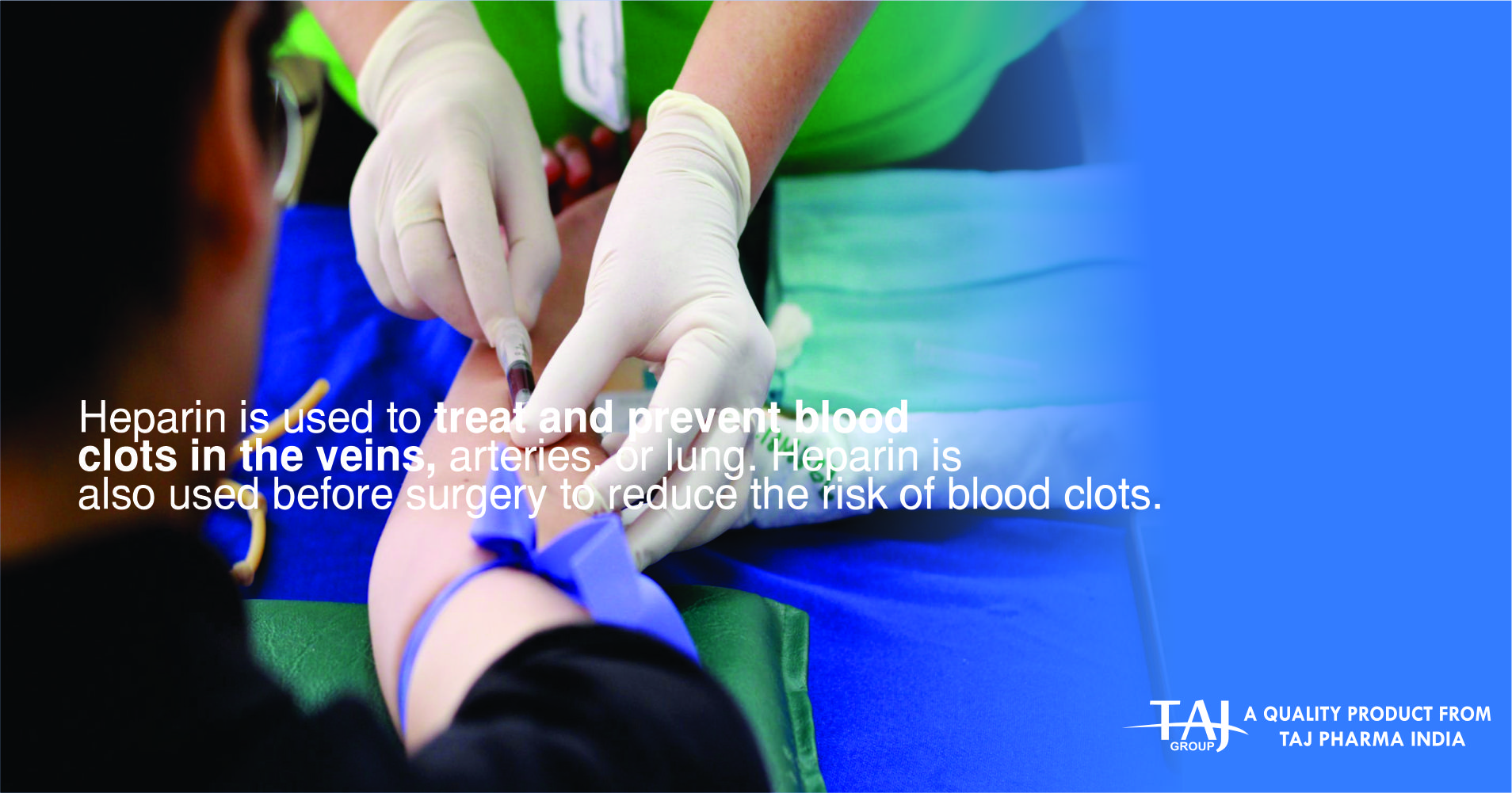FAQ's
Heparin is used to prevent blood clots from forming in people who have certain medical conditions or who are undergoing certain medical procedures that increase the chance that clots will form. Heparin is also used to stop the growth of clots that have already formed in the blood vessels, but it cannot be used to decrease the size of clots that have already formed. Heparin is also used in small amounts to prevent blood clots from forming in catheters (small plastic tubes through which medication can be administered or blood drawn) that are left in veins over a period of time. Heparin is in a class of medications called anticoagulants ('blood thinners'). It works by decreasing the clotting ability of the blood.
Heparin comes as a solution (liquid) to be injected intravenously (into a vein) or deeply under the skin and as a dilute (less concentrated) solution to be injected into intravenous catheters. Heparin should not be injected into a muscle. Heparin is sometimes injected one to six times a day and sometimes given as a slow, continuous injection into the vein. When heparin is used to prevent blood clots from forming in intravenous catheters, it is usually used when the catheter is first put in place, and every time that blood is drawn out of the catheter or medication is given through the catheter.
Heparin may be given to you by a nurse or other healthcare provider, or you may be told to inject the medication by yourself at home. If you will be injecting heparin yourself, a healthcare provider will show you how to inject the medication. Ask your doctor, nurse, or pharmacist if you do not understand these directions or have any questions about where on your body you should inject heparin, how to give the injection, or how to dispose of used needles and syringes after you inject the medication.
If you will be injecting heparin yourself, follow the directions on your prescription label carefully, and ask your doctor or pharmacist to explain any part you do not understand. Use heparin exactly as directed. Do not use more or less of it or use it more often than prescribed by your doctor.
Heparin solution comes in different strengths, and using the wrong strength may cause serious problems. Before giving an injection of heparin, check the package label to make sure it is the strength of heparin solution that your doctor prescribed for you. If the strength of heparin is not correct do not use the heparin and call your doctor or pharmacist right away.
Your doctor may increase or decrease your dose during your heparin treatment. If you will be injecting heparin yourself, be sure you know how much medication you should use.
Heparin is also sometimes used alone or in combination with aspirin to prevent pregnancy loss and other problems in pregnant women who have certain medical conditions and who have experienced these problems in their earlier pregnancies. Talk to your doctor or pharmacist about the risks of using this medication to treat your condition.
This medication may be prescribed for other uses; ask your doctor or pharmacist for more information.
Before using heparin,
• tell your doctor and pharmacist if you are allergic to heparin, any other medications, beef products,pork products, or any of the ingredients in heparin injection. Ask your doctor or pharmacist for a list of the ingredients.
• tell your doctor and pharmacist what prescription and nonprescription medications, vitamins, nutritional supplements, and herbal products you are taking or plan to take. Be sure to mention any of the following: other anticoagulants such as warfarin (Coumadin); antihistamines (in many cough and cold products); antithrombin III (Thrombate III); aspirin or aspirin-containing products and other nonsteroidal anti-inflammatory drugs (NSAIDs) such as ibuprofen (Advil, Motrin) and naproxen (Aleve, Naprosyn); dextran; digoxin (Digitek, Lanoxin); dipyridamole (Persantine, in Aggrenox); hydroxychloroquine (Plaquenil); indomethacin (Indocin); phenylbutazone (Azolid) (not available in the US); quinine; and tetracycline antibiotics such as demeclocycline (Declomycin), doxycycline (Monodox, Vibramycin), minocycline (Dynacin, Minocin) and tetracycline (Bristacycline, Sumycin). Your doctor may need to change the doses of your medications or monitor you carefully for side effects.
• tell your doctor if you have a low level of platelets (type of blood cells needed for normal clotting) in your blood and if you have heavy bleeding that cannot be stopped anywhere in your body. Your doctor may tell you not to use heparin.
• tell your doctor if you are currently experiencing your menstrual period; if you have a fever or an infection; and if you have recently had a spinal tap (removal of a small amount of the fluid that bathes the spinal cord to test for infection or other problems), spinal anesthesia (administration of pain medication in the area around the spine), surgery, especially involving the brain, spinal cord or eye, or a heart attack. Also tell your doctor if you have or have ever had a bleeding disorder such as hemophilia (condition in which the blood does not clot normally), antithrombin III deficiency (condition that causes blood clots to form), blood clots in the legs, lungs, or anywhere in the body, unusual bruising or purple spots under the skin, cancer, ulcers in the stomach or intestine, a tube that drains the stomach or intestine, high blood pressure, or liver disease.
• tell your doctor if you are pregnant, plan to become pregnant, or are breast-feeding. If you become pregnant while using heparin, call your doctor.
• if you are having surgery, including dental surgery, tell the doctor or dentist that you are using heparin.
• tell your doctor if you smoke or use tobacco products and if you stop smoking at any time during your treatment with heparin. Smoking may decrease the effectiveness of this medication.
Unless your doctor tells you otherwise, continue your normal diet.
If you will be injecting heparin yourself at home, talk to your doctor about what you should do if you forget to inject a dose.
Heparin may cause side effects. Tell your doctor if any of these symptoms are severe or do not go away:
• redness, pain, bruising, or sores at the spot where heparin was injected
• hair loss
Some side effects can be serious. If you experience any of these symptoms, call your doctor immediately:
• unusual bruising or bleeding
• vomit that is bloody or looks like coffee grounds
• stool that contains bright red blood or is black and tarry
• blood in urine
• excessive tiredness
• nausea
• vomiting
• chest pain, pressure, or squeezing discomfort
• discomfort in the arms, shoulder, jaw, neck, or back
• coughing up blood
• excessive sweating
• sudden severe headache
• lightheadedness or fainting
• sudden loss of balance or coordination
• sudden trouble walking
• sudden numbness or weakness of the face, arm or leg, especially on one side of the body
• sudden confusion, or difficulty speaking or understanding speech
• difficulty seeing in one or both eyes
• purple or black skin discoloration
• pain and blue or dark discoloration in the arms or legs
• itching and burning, especially on the bottoms of the feet
• chills
• fever
• hives
• rash
• wheezing
• shortness of breath
• difficulty breathing or swallowing
• hoarseness
• painful erection that lasts for hours
Heparin may cause osteoporosis (condition in which the bones become weak and may break easily), especially in people who use the medication for a long time. Talk to your doctor about the risks of using this medication.
Heparin may cause other side effects. Call your doctor if you have any unusual problems while using this medication.
If you will be injecting heparin at home, your healthcare provider will tell you how to store the medication. Follow these directions carefully. Be sure to keep this medication in the container it came in, tightly closed, and out of reach of children. Store it at room temperature and away from excess heat and moisture (not in the bathroom). Do not freeze heparin.
It is important to keep all medication out of sight and reach of children as many containers (such as weekly pill minders and those for eye drops, creams, patches, and inhalers) are not child-resistant and young children can open them easily. To protect young children from poisoning, always lock safety caps and immediately place the medication in a safe location – one that is up and away and out of their sight and reach. http://www.upandaway.org
Unneeded medications should be disposed of in special ways to ensure that pets, children, and other people cannot consume them. However, you should not flush this medication down the toilet. Instead, the best way to dispose of your medication is through a medicine take-back program. Talk to your pharmacist or contact your local garbage/recycling department to learn about take-back programs in your community. See the FDA's Safe Disposal of Medicines website (http://goo.gl/c4Rm4p) for more information if you do not have access to a take-back program.
In case of overdose, call the poison control helpline at 1-800-222-1222. Information is also available online at https://www.poisonhelp.org/help. If the victim has collapsed, had a seizure, has trouble breathing, or can't be awakened, immediately call emergency services at 911.
Symptoms of overdose may include:
• nosebleed
• blood in urine
• black, tarry stools
• easy bruising
• unusual bleeding
• red blood in stools
• vomit that is bloody or looks like coffee grounds
Keep all appointments with your doctor and the laboratory. Your doctor will order certain lab tests to check your body's response to heparin. Your doctor may ask you to check your stool for blood using an at-home test.
Before having any laboratory test, tell your doctor and the laboratory personnel that you are using heparin.
Do not let anyone else use your medication. Ask your pharmacist any questions you have about refilling your prescription.
It is important for you to keep a written list of all of the prescription and nonprescription (over-the-counter) medicines you are taking, as well as any products such as vitamins, minerals, or other dietary supplements. You should bring this list with you each time you visit a doctor or if you are admitted to a hospital. It is also important information to carry with you in case of emergencies.
Our Partners
A dream for new world Anchored in India and committed to its traditional values of leadership with trust, the Taj Pharma Group is spreading its footprint globally through excellence and innovation.Taj Pahrma India.











Important Safety Information
Allergy warning
Beprin can cause a severe allergic reaction. Symptoms can include: skin tissue death at the injection site, chills, fever, rash, hives, itching, burning, shortness of breath, swelling of your face, lips, throat, or tongue If you develop these symptoms, go to the nearest emergency room.
Don’t take this drug again if you’ve ever had an allergic reaction to it. Beprin is derived from animal tissue. It should be used with caution in people with a history of allergy to this drug or to pig proteins. Taking beprin could be fatal (cause death).
Warnings for people with certain health conditions
For people with pig protein sensitivity: Do not take this drug. This drug is made from pork tissue and can cause a life-threatening allergic reaction in people who are sensitive or allergic to other pig proteins.
For people with uncontrolled high blood pressure: You are at an increased risk of bleeding from this drug. Talk to your doctor before using beprin.
For people with bleeding or clotting problems: If you have abnormal bleeding or a condition that puts you at an increased risk of bleeding, using beprin could increase your risk even more. Use Beprin with caution.
For people with a history of stomach ulcers or bleeding: If you have active stomach ulcers, you should not use beprin. It could make your ulcers worse and cause dangerous bleeding. If you have a history of stomach ulcers but don’t have active ulcers, using beprin puts you at an increased risk of bleeding. You should talk to your doctor before using beprin.
For people with kidney disease: If you have severe kidney disease or a history of kidney disease, taking beprin can increase your risk of bleeding. Talk to your doctor before using beprin.
For people with liver disease: If you have severe liver disease or a history of liver disease, taking beprin can increase your risk of bleeding. Talk to your doctor before using beprin.
For people with asthma or sulfite sensitivity: People with asthma are likely to be sensitive to sulfites. Sulfites can cause a life-threatening allergic reaction in some people. Some forms of this drug contain sulfites. Talk to your doctor about using a sulfite-free version of beprin.
Warnings for other groups
For pregnant women: Research in animals has shown negative effects to the fetus when the mother uses beprin. However, there haven’t been enough studies done in humans to be certain how the drug might affect the fetus. Talk to your doctor if you’re pregnant or plan to become pregnant. This drug should only be used if the potential benefit justifies the potential risk. Ask your doctor if using the preservative-free version of beprin would be better for you than the version that contains benzyl alcohol. If you become pregnant while taking this drug, call your doctor right away.
For women who are breastfeeding: Beprin is unlikely to pass into breast milk and be absorbed by an infant who is breastfed. Talk to your doctor about the best way to feed your child while you’re taking beprin. Some forms of beprin contain a preservative called benzyl alcohol. This ingredient can slow down the central nervous system in some infants. It has also caused trouble breathing and changes in the blood chemistry in some infants. These effects can be deadly. If you breastfeed your child, talk to your doctor about preservative-free beprin.
For seniors: If you are older than 60 years, you may be at a higher risk of bleeding. Beprin also increases your risk of bleeding, so your doctor may start you on a reduced dosage.
For children: This medication has not been studied in children. Dosage recommendations are based on clinical experience. Newborns and infants should receive preservative-free beprin. The preservative benzyl alcohol has been linked to serious side effects and even death in newborns and infants.